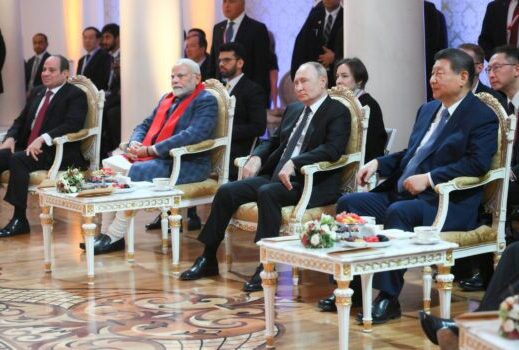 Russian President Vladimir Putin welcomed 36 world leaders to a major BRICS summit in Kazan, showcasing Moscow’s continued global influence despite Western sanctions and an International Criminal Court arrest warrant. The three-day gathering marks the largest international meeting hosted by Putin since Russia’s invasion of Ukraine in 2022.
Russian President Vladimir Putin welcomed 36 world leaders to a major BRICS summit in Kazan, showcasing Moscow’s continued global influence despite Western sanctions and an International Criminal Court arrest warrant. The three-day gathering marks the largest international meeting hosted by Putin since Russia’s invasion of Ukraine in 2022.
Chinese President Xi Jinping, greeting Putin as a “dear friend,” emphasized the world’s unprecedented changes, while Indian Prime Minister Narendra Modi called for a swift, peaceful resolution to the Ukraine conflict. South African President Cyril Ramaphosa praised Russia as a “valued ally.”
The summit’s primary focus is reducing dollar-dependent transactions to minimize U.S. sanctions’ impact. Putin, meeting with BRICS New Development Bank President Dilma Rousseff, advocated for increased use of local currencies to separate economic development from political pressures.
The BRICS group, originally comprising Brazil, Russia, India, China, and South Africa, has expanded to include Egypt, the UAE, Ethiopia, and Iran. Notable potential members include Turkey and Saudi Arabia, though Argentina recently withdrew its application following presidential elections.
UN Secretary General António Guterres’s attendance has sparked controversy, particularly from Ukraine, given Putin’s ICC arrest warrant. The UN maintained Guterres would reiterate his position that Russia’s invasion violates the UN charter.
Carnegie Russia Eurasia Centre Director Alex Gabuev noted the summit’s significance for Putin, demonstrating Russia’s role in shaping future international order rather than being isolated. However, the group’s expansion raises questions about maintaining ideological cohesion, with members like Brazil and India showing varying degrees of alignment with anti-Western positions.
The summit occurs as Putin anticipates potential shifts in global politics, including possible changes in U.S. leadership and growing war fatigue in Europe regarding Ukraine. While BRICS+ members represent a larger combined GDP than the G7 or EU, their primary focus remains developing economic and technological platforms independent of U.S. influence.

White House Says Military Option Open On Greenland Acquisition
Trump Calls Case Against Maduro “Infallible” Ahead Of U.S. Court Appearance
South Africa Raids U.S. Refugee Processing Centre, Arrests Seven Kenyans
Time Magazine Names AI Visionaries ‘Person of the Year’